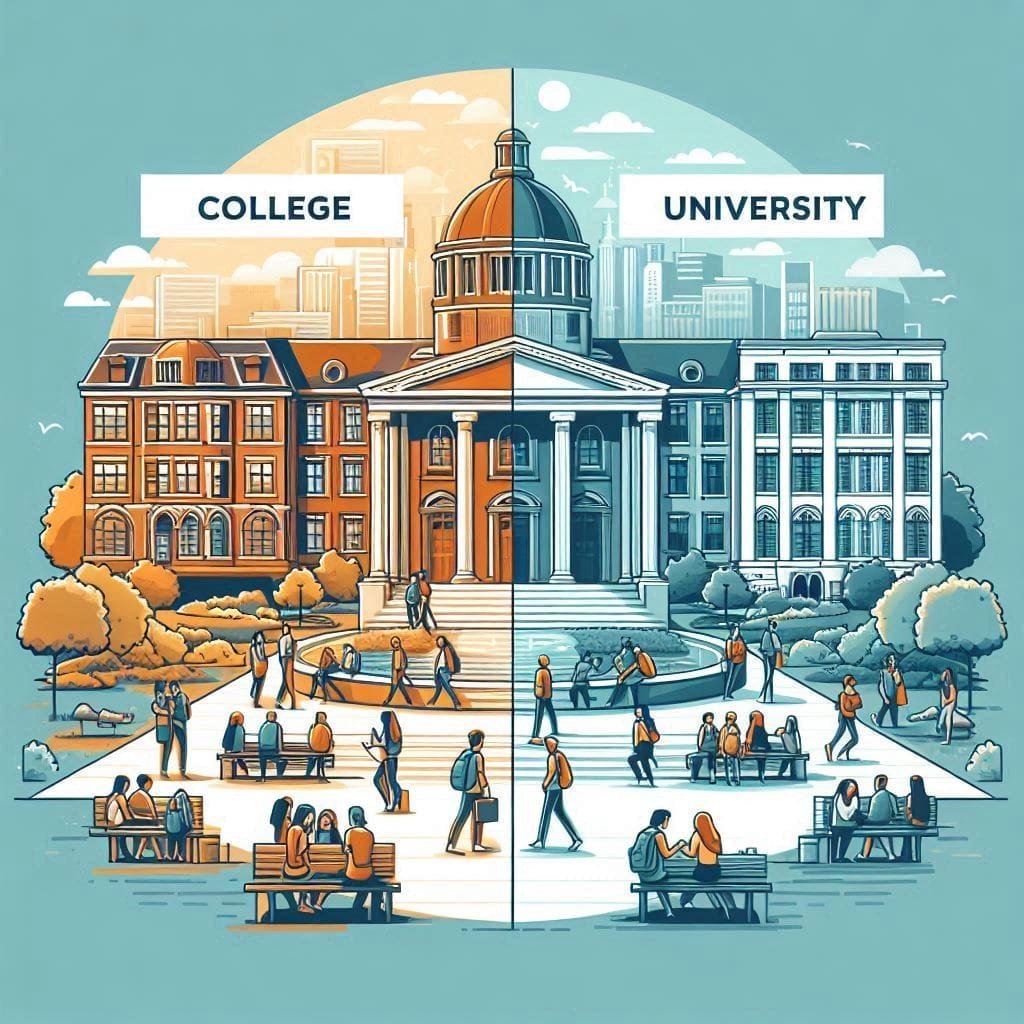When you are exploring the world of higher education, the terms College and University often leads you to confusion. This confusion is often caused because of the words people use to describe their study levels, as both college and university serve the purpose of providing education and knowledge. Both these institutes have, however recognizable and distinct characteristics and functions that set them apart. Here, I have broken down a list of differences between college and universities.
Definitions
Definition is an important part when describing the difference between two things. Both the institutes, college and university have somewhat similar yet different definitions:
- College:
- It generally refers to smaller institutions that focus on the undergraduate education.
- It offers a more familiar learning environment, often with smaller class sizes and more personalized attention from the staff.
- It may also provide associate degrees, bachelor`s degree and sometimes specialized programs in particular fields such as liberal arts or technical training.
- University:
- it refers to typically larger institutions that offer both, the undergraduate and graduate degrees.
- It consists of various colleges and schools (like a college of science and arts, a college of engineering, etc.) that allows a broader range of programs and research opportunities.
- It often engages in large-scale researches.
- It may have doctoral programs, that contributes to their academic status.
Key Differences
Following are the major differences that contribute to the better understanding of the difference between college and university.
- Size and Scope:
- Colleges are generally smaller. They focus primarily on undergraduate education. They often promote affectionate environment and communities where students can form strong relationships with the staff members and their college mates.
- Universities are comparatively larger and offer a wide range of academic programs. These programs include masters and doctoral degrees. Universities can also provide students with more various academic resources and extracurricular opportunities.
- Research Opportunities:
- Colleges can have limited research facilities as they primarily focus on teaching and learning.
- Universities, on the other hand have an outstanding funding for research. This allows students to engage in innovative and fresh projects and also collaborate with faculty on various studies.
- Degree Offerings:
- Colleges usually offer bachelor degrees and associate degrees and associate degrees. Some colleges may also have graduate programs but that is less common.
- Universities provide a comprehensive range of degrees starting from undergraduate to graduate degrees. These also include masters and doctoral degrees along with specialized professional programs like law and medicine.
- Campus Life:
- Colleges often promote a close and comfortable environment and communities, with smaller campus sizes. This leads to more social interactions between the students and the faculty members and also more extracurricular activities.
- Universities in this regard, have a more wide and crowded campus life. It also includes numerous students’ organizations, activities and events to provide for a larger student body.
- Admissions:
- Colleges may have less competitive admission procedures, that focuses on personal statements and interviews along with academic qualifications.
- Universities often have more careful admission standards, particularly for competitive programs. These include confidential statements and high grades along with academic qualifications.
Global Perspectives
Both the terminologies have different significance in different countries. Some of these references are given below;
- In Canada, the term college often refers to the institutions that provide vocational training and diplomas. While universities symbolize degree-granting institutions.
- In the United Kingdom, college refers to institutions that prepare students for university or may offer further education. While university refers to the degree-awarding institutions.
- In Australia, colleges are referred to secondary schools and institutions that offer vocational training. It may also denote smaller compartments of the university. While universities are institutions that confer undergraduate and postgraduate degrees.
- In Japan, college often refers to institutions that provide two or three year programs (like junior colleges). While universities are institutions that offer four year undergraduate degrees and then graduate programs.
Conclusions
While colleges and universities, both imply different levels of education and types of institutions across the countries, they generally relate to the same fundamental concepts. Therefore, understanding the difference between colleges and universities can help students to make knowledgeable decisions about their educational paths. Whether you are looking for a more personalized educational experience or huge research opportunities, if you know about these differences, it can help you in choosing the right institutions for your academic and career goals. Along with your institute options, also focus on the environment and resources that will best support your aspirations.
FREQUENTLY ASKED QUESTIONS (FAQs)
What is the primary difference between a college and a university?
A college typically focuses on the undergraduate education, while a university provides a wide range of degrees, including graduate, masters and doctoral degrees along with specialized education like law.
Which has more research opportunities?
Universities comparatively have more research opportunities and resources that offers the students a good educational environment.
Do colleges offer graduate degrees?
Some colleges may offer limited graduate programs but it is less common. Likewise universities provide a full range of graduate degrees.
Can a college be part of a university?
Yes, many universities consist of multiple colleges or schools. Like the College of Arts and Science, a School of Business etc.
Does the terminology vary by country?
Yes, terminology can vary. For example, in the U.S., “college” can refer to any post-secondary institution, while in the UK, “college” often refers to a part of a university or a standalone institution for further education.
Found this helpful? Don’t miss out on our other great articles!
